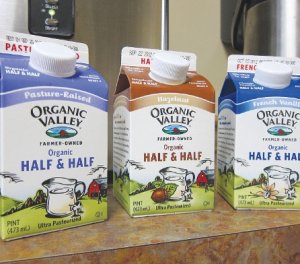Winners of the 2012 BusinessWeek award for America’s Most Promising Social Entrepreneurs, CROPP Cooperative (www.farmers.coop) is owned by 1766 organic farmers in the USA and Canada and has 680 employees.
At a dinner for investors (who own non-voting preference shares), Siemon stated that sales for 2012 are projected at US$875m with the dairy side of the business being responsible for 89.7% of CROPP’s revenue, while the remaining 10.3% comes from eggs, meat, farm services and feed, logistics, soy, juice and produce.
The co-op’s Organic Valley (www.organicvalley.coop) and Organic Prairie (www.organicprairie.coop) brands represent 43% of the co-op’s revenue while the relatively new Stonyfield yogurt brand brings in 9%. Private label brands, supplying to supermarkets and the like, represent 17% of their revenue, and bulk milk and ingredient sales a further 28%.
In 2011, at US$26.55 per cwt, the co-op paid a US$13.33 premium over the price of regular milk. That was a good year; while the price paid for organic milk has risen in a stable way, what is paid for standard milk floats
up and down.
Cooperative Network (www.cooperativenetwork.coop) is Wisconsin’s association of cooperative businesses. President and chief executive Bill Oemichen said, “Organic Valley is providing financial stability to a large number of dairy producers inside and outside of Wisconsin during a time of tremendous price volatility.”
CROPP makes it clear that the cooperative business model is one of the keys to its success, stressing farmer ownership in all its marketing – its website is found on virtually all its products.
Governance of the co-op is by seven elected board members with two board advisors. Members’ opinions are carried through to the board from elected regional executive committees.
Interestingly, the co-op credits their success largely to the partnership culture they’ve created between farmers, employees and consumers, with each having a role in the cooperative. Building a base of loyal customers, they argue, allows the cooperative to bring more farm families into the cooperative along with their land, water and animals.
While their priority will always be providing a fair and stable price to farmers for their milk and other products, CROPP has a profit sharing model that recognises the contributions of all three groups, distributing 45% of the co-op’s profit to farmers, 45% to employees and 10% to the community.
‘As a co-op, we start with the final pay price and we go up from there,’ Siemon told Cooperative Business Journal. “We have a profit goal at end of the year of 2%. Here’s what our farmers need to be paid to be sustainable, and we need a 2% profit to stabilise the co-op. We try to run a thrifty outfit here, and yet be a national business. We’re owned by farmers and we know what their work ethic is.”
• Ramsey Margolis is executive director of the New Zealand Cooperatives Association. http://nz.coop/blog
















